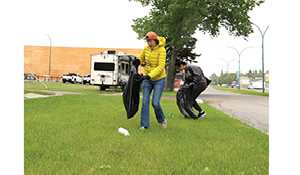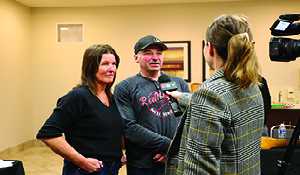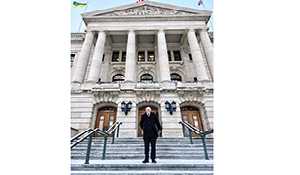Moe outlines 10 priorities in letter to PM ahead of First Ministers meeting
Local MLA weighs in on premier’s points to Carney
May 20, 2025, 12:32 pm
Ryan Kiedrowski, Local Journalism Initiative Reporter


Saskatchewan Premier Scott Moe has let the federal government know the top 10 priorities of Saskatchewan. In a letter dated May 13, Moe thanked Prime Minister Mark Carney for their recent discussion after the federal election.
“This is the first step towards resetting the relationship between Saskatchewan and the federal government, and I appreciate your willingness to govern for all Canadians,” said Moe in the letter.
He followed the salutation with 10 key policy points referred to as the “Strong Saskatchewan, Strong Canada Plan,” illustrating a “third option” in what is commonly a black and white political landscape.
“It’s very interesting, every day in the House, the NDP is talking about separation, and the point that they keep saying is ‘why is this Sask Party talking about separation’ when the government really isn’t talking about that at all! It’s the opposition that keeps bringing up the subject,” said Moosomin-Montmartre MLA Kevin Weedmark when asked about his reaction to the letter.
“Our government feels that separation isn’t the preferred option, and the ‘status quo’ isn’t the preferred option. Under the status quo we’ve had a lot of federal policies enacted by the federal government over the last number of years—supported by the federal NDP—that have really hurt Saskatchewan, really gone against our interests.
“So we think there needs to be a third way between the status quo and between the extreme option of separation. And that third way is making adjustments in conjunction with the federal government to allow a strong Saskatchewan within a strong, united Canada.”
After Moe invited Carney to Saskatchewan, the Prime Minister suggested holding a first ministers meeting—including the prime minister, provincial, and territorial premiers on June 2 in Saskatoon.
Weedmark says changes positive for province and country
In an interview last week, Weedmark expanded on each of the 10 points Moe outlined. Each of the 10 points are what Weedmark described as “vitally important,” and are subjects the provincial government have long been attempting to raise with federal counterparts. Following are his comments on each of the points in the letter:
1. Immediately begin negotiations with China to remove Chinese tariffs on Canadian agri-food products.
“We all know that those tariffs are in place to protect a non-existent Canadian electric vehicle manufacturing industry,” Weedmark said. “So there’s no reason that the government couldn’t move on that.”
2. Strengthen the criminal code through bail reform and the introduction of stronger penalties to fight against new street drugs.
“Again, I think that’s vital not only for Saskatchewan, but for the entire country,” Weedmark said.
3. Stop attempting to collect the federal carbon tax on home heating from Saskatchewan to be in line with recent full removal of consumer carbon tax.
“Of course, that was put in place in Saskatchewan to level the playing field with the removal of the carbon tax on home heating oil that’s used in some other parts of the country,” noted Weedmark.
4. Transfer responsibility for the output-based pricing systems for heavy emitters to the provinces to ensure measures consider each province’s unique structure, economic realities, and trade exposure.
“The purpose of that really is something that can be handled better at the provincial level,” Weedmark explained. “So Saskatchewan has removed that, we put a pause on the industrial carbon tax, and that makes things more affordable for everyone. If you’ve got a carbon tax on your industries, either that tax is hurting Canadian consumers by driving up the price, or it’s making that industry less competitive with its foreign competitors in the case of export-oriented industries.”
While a lot of attention has been garnered by the Trump tariffs, Weedmark pointed out “a carbon tax has the exact same impact on a Saskatchewan potash mine as the Trump tariff has.
“Saskatchewan potash producers have far higher environmental standards than our competitors, far higher labor standards than our competitors, and far higher safety standards than our competitors,” he said. “Adding another cost of the carbon tax that our competitors overseas don’t pay is harming our own industries, harming our own competitiveness, and literally having the exact same effect as a foreign tariff would have, driving up the cost of our products and making them less competitive,” he said.
5. Repeal the unachievable and unaffordable Clean Electricity Regulations and extend the life of coal power plants to provide affordable and reliable base-load power to Saskatchewan residents.
“We rely on those coal power plants right now,” Weedmark said. “We have invested heavily in renewables, and you’ll see some major projects going ahead shortly here with more renewable power, but we still need that reliable base load power from coal. The province can’t move forward without knowing that those clean electricity regulations are going to be repealed.”
6. Repeal the Oil and Gas Emissions Cap to create investment certainty and secure the supply of Canadian energy products, some of the most sustainable in the world.
“Why would we want to harm our own producers, who meet such high standards and benefit foreign producers that don’t meet those standards?” Weedmark asked. “That makes no sense.”
7. Build trade and economic corridors across the country and remove legislation that impacts the movement of wester Canadian goods, to effectively and efficiently get our goods to domestic and international markets.
“There’s a couple pieces of federal legislation that make it very difficult right now to move products by pipeline, to build new pipelines,” Weedmark said. “We need that gone so that we can continue to grow and expand this province, because there’s so much potential for this province.
“We’re very fortunate with our natural resources, but we’ve been hemmed in by some federal regulations that have made it difficult to get our products to market,” he continued. “As prosperous as Saskatchewan is, we could be so much more if the federal government is willing to work with us.”
8. Restore the investment climate and streamlining federal approval process to allow major projects to proceed.
“There used to be a willingness of companies to invest because they understood how the regulatory process worked,” Weedmark said. “There were timelines, they understood sometimes it took a few years, but there was a timeline. Now, companies are more hesitant to invest because it’s unclear when and if they would get approval after investing significant amounts to try to get a project off the ground.”
9. Expand pipeline capacity to protect the collective energy security for our nation, which will open up rail and port capacity for other exportable commodities.
This point in particular brought back memories of the Energy East 2.0 event in Moosomin, which noted the attendance of premiers, MPs, federal senators, and leaders in the oil and gas industry.
“The federal Liberal government declined to attend, and the provincial NDP opposition declined to attend,” recalled Weedmark. “The point of that whole event was to try to get everyone on the same page. We were making the point then that we need to expand our pipeline capacity with Energy East. The original Energy East would have included a 1.05-million barrel tank farm at Moosomin—three 350,000-barrel tanks—and it would have had on-ramp pipeline money from Cromer, Manitoba, another one from the Bakken oil field to the southwest. Those would have been an on ramp onto that pipeline at Moosomin, so it would have helped southeast Saskatchewan by having immediate access right there to get onto the pipeline to get an export position. It was a great idea.”
10. Fundamentally reform the Impact Assessment Act, cutting red tape and streamlining the process to avoid duplication and infringement into provincial jurisdiction.
“We’ve got the strongest economy in the country,” Weedmark said. “We’ve got the second highest growth after PEI. We are the most affordable place to live in Canada. We’ve got the only balanced budget in Canada. We’re the only province with no carbon tax, and that’s not by accident, that’s because of a decade-and-a-half of policies that matter.”
New chapter or more of the same?
It’s still early in Carney’s leadership, but some of the feelings from the Trudeau Liberals still linger.
“We could be so much more if the federal government is willing to work with us and help create a climate where we can continue to build a prosperous and growing Saskatchewan within a strong and united Canada,” Weedmark said, describing the current mood around the new leader as ‘cautious optimism.’
“There are some rumblings about separation out there, because a lot of people are very unhappy with the way the federal government has done things for the last few years. People are worried that there will be more of the same.
“I am hopeful that the Prime Minister Carney is going to close one chapter on the way this government has handled things, and start a whole new chapter; start with listening to the provinces and being willing to work with us. Take some of this great advice that the premier has given him, and work with us to ensure that Saskatchewan voices are heard and that Saskatchewan people can live up to their full potential.”
Premier Moe’s letter to Prime Minister Carney was posted to social media platforms last week, garnering a lot of attention.
“Transparency is vitally important in this day and age,” Weedmark said. “Since I’ve been elected as MLA, I have been trying to do my part to keep my constituents continually informed of what I’m doing.”
Weedmark noted using every form of social and traditional media possible to reach residents in Moosomin-Montmartre to keep them abreast of what’s happening at the provincial government level, and it is working.
“There’s a lot of engagement on all those channels,” he said. “Every time we send out that email, I seem to get a few comments back, or people mentioning to me, ‘thank you so much for letting us know what you’re doing, what you’re up to, what’s going on behind the scenes.’ I think people understand exactly what’s involved, what’s happening at the provincial level, and that’s what I’m committed to continuing. I think this government is committed to being as open and transparent as possible.”






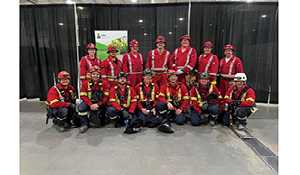





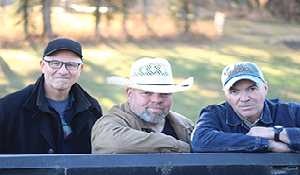

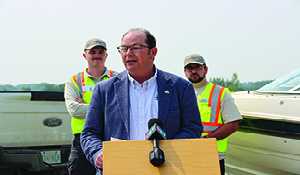










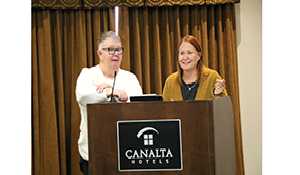

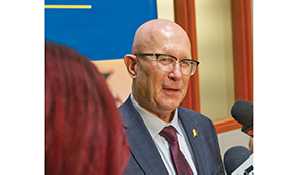
SM.jpg)
